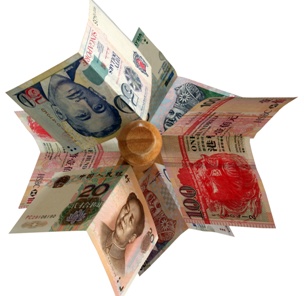The China Model Meets the Super-Rich
Bill Gates and Warren Buffet's philanthropy mission to China is bound to make its billionaires and rulers uncomfortable.
 Ever since Deng Xiaoping unleashed the powerful dragon of Chinese economic dynamism three decades ago, China has been a test bed for some fundamental ideas about how economic and political structures do or do not relate to each other. The key question is whether independent centers of economic power of the sort that inevitably arise in a vibrant market economy can coexist indefinitely with the highly concentrated political power of an authoritarian state. So far in China they have. This has made China an attractive model for political leaders elsewhere--including conservatives in Iran and Israeli leaders hoping to keep Palestinians in the occupied territories placid--who would like to see their subjects enjoy similar economic growth without giving them full political rights.
Ever since Deng Xiaoping unleashed the powerful dragon of Chinese economic dynamism three decades ago, China has been a test bed for some fundamental ideas about how economic and political structures do or do not relate to each other. The key question is whether independent centers of economic power of the sort that inevitably arise in a vibrant market economy can coexist indefinitely with the highly concentrated political power of an authoritarian state. So far in China they have. This has made China an attractive model for political leaders elsewhere--including conservatives in Iran and Israeli leaders hoping to keep Palestinians in the occupied territories placid--who would like to see their subjects enjoy similar economic growth without giving them full political rights.
But "so far" is an important qualification, and three decades may not be sufficient time for the most important political ramifications of China's economic boom to play out. That boom has created scores of Chinese billionaires. It is hard to believe that this kind of independently generated economic clout doesn't entail at least the potential for straining a political system that is still a dictatorship of the Chinese Communist Party.
A coming visit to China by Bill Gates and Warren Buffett, who want to teach some of those Chinese billionaires about responsible philanthropy, may indirectly increase the strain. The initial wary reaction to the mission of Gates and Buffett by Chinese tycoons, some of whom have declined to meet with the Americans and others of whom have nervously inquired whether they would be asked to start writing checks, probably suits the rulers in Beijing just fine. For newly rich Chinese to concentrate on hoarding their fortunes rather than thinking about new areas to conquer or boats to rock is the way the regime would like the China model to work.
The raising by Gates and Buffett of the issue of philanthropy (or the relative lack of it) in China may set in motion, however, processes than neither the regime nor the Chinese billionaires can control. The stinginess to date of most of the newly rich Chinese already has become a subject of public discussion in China. This is apt to lead to more discussion of economic inequality in China, which cannot be a comfortable topic for the regime. An even more uncomfortable topic is the corruption that has helped some of the Chinese billionaires gain their wealth.
To the extent those billionaires start emulating Gates and Buffett and opening their wallets, this raises yet another source of discomfort for the regime: the demonstration that there are public needs in China that the state is not meeting and somebody else is. More prominence to charitable work also may mean more attention to nonprofit groups that adopt social causes and organize people to raise money. And that is another concern to the regime because, as one Chinese scholar put it, "that means the organization represents some social force." All of this evokes the well-established principle that social pluralism and a healthy civil society are necessary conditions for the emergence of a stable democracy.
Of course, necessary conditions are not sufficient ones. The Chinese Communist Party is not likely to lose its grip any time soon. And I doubt that Bill Gates and Warren Buffett are trying to stir up political ferment; I believe they are simply doing exactly what they say they are doing, which is to try to persuade other extremely wealthy people to put much of their wealth to work for a greater good. But maybe their philanthropic proselytizing will, ever so slightly and over a longer term, help to bring about another greater good, which is to nudge the citizens of the world's most populous country closer to political liberties they do not now have.
